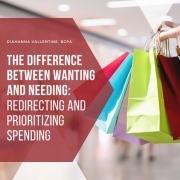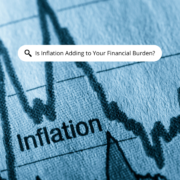The Difference Between Wanting and Needing: Redirecting and Prioritizing Spending
Often when I am out shopping, I find myself picking up items that I think I really need. I justify it rather quickly and find myself with buyers’ regret shortly thereafter. The most irritating habit I have is not returning it to the store and getting my money back. Last week, I was cleaning out drawers and found a few bags of clothing that I had every intention of returning but it escaped my attention. I also found dresses, jeans, shoes, several coats, and a suit that had purchased but forgot about. Some of them for my granddaughter who now had long outgrown them and for me, well I thought I needed them.
I’ve also gone through storage and closets and found household items that “I really, really needed” at the time, but there they were never opened or rarely used some with the sales tags still attached. I thought I should add up the costs of these items and see just how much money I had wasted. It had added up to over a thousand dollars. Yes, I will donate these things to a charity such as a homeless facility, and, it makes me realize it can be a blessing to others, but is there a better way to serve than by happenstance? Am I doing a disservice to myself by spending without being mindful of where my dollars are going? I would argue that both are true.
I’m learning to be mindful of all of my spendings. It’s making me prioritize my needs and wants. This is especially important when you have ongoing medical bills and prescriptions to manage and pay for. They can seem to be overwhelming at times. Though, I don’t have high medical bills currently, I do recognize that may not always be the case. So, diverting some money into an HSA or a regular savings account for the sole purpose of this future need could help me in the future. You can look at it as investing in yourself or, ” paying yourself first.”
We all have bills to pay but rarely do we see ourselves as important as one of those bills. Consider setting aside $15 to $25 every pay period for medical expenses. Or, if you have bills that are already outstanding, call the service provider and request to pay a little toward those bills every month. You may be surprised how little they may be willing to take. They are in the business of service and you are their customer. Trust me, they don’t want you to leave. By putting a little each month towards the bills can help you stay in good standing with the medical provider and can help keep the bill from going to a collector and from hitting your credit report.
Also, do what I did. Look around your house for things you no longer need or don’t want. Consider selling them. Not only will you be freeing up space at home, but you can also make some cash. There are online selling apps like OfferUp, BookScouter, eBay, and more. Terminate subscriptions you no longer need. Pay especially close attention to online subscriptions you may have forgotten about.
Another creative way of finding more cash is to always make change when buying something at the store. Everything in coin change put in a jar. Deliberately seek out change-making opportunities. You may be surprised at how much you save. I did and saved almost $800.00 in a year.
Consider online banks that may offer more interest than perhaps your neighborhood bank. Buy only what you’re going to eat. A study published in the American Journal of Agriculture Economics found that the average household wasted 31.9% of its food. The US total annual cost of wasted food was estimated to be $240 billion or $1,866 per household. In fact, wasted food is the largest component taking up space in US landfills. And the United States discards more food waste than any other country. That adds up to 30-40% of the entire US food supply. So, don’t waste and keep that money in your pocket.
Spending comes down to desiring to satisfy oneself, however temporarily, and often supersedes logic. It’s impulse buying. Even when we know we should be directing our money to important things such as; managing the costs of healthcare, utilities, etc., it’s often difficult to stop wasteful spending. And the temporary feelings of satisfaction quickly wear off when bills start coming in.
Getting control of this habit is achievable and not really complicated. Create a reasonable budget. Start by keeping a record of EVERYTHING you spend for a month. This may take a bit of work but is well worth the effort. Make a list of all your bills, including anticipated medical bills. Are you spending more than you make? I’ve found that when putting this down in writing, when you see it, it becomes real and important. Putting together a budget is actually very freeing. It will allow you to reduce impulsive discretionary spending and allow you to focus on getting a firm grasp on your financial life. And, the payday of reduced financial stress is like icing on the cake.

Diahanna Vallentine, BCPA, Financial Empowerment Lead
In 2002 Diahanna and her husband received the news that her husband had MGUS, a precursor to Multiple Myeloma. Upon her husband death in 2013, Diahanna immediately decided to make it her mission to help patients and caregivers empower themselves to speak up and to position themselves as partners in their treatment. Diahanna became a Board-Certified Patient Advocate. She is currently the Financial Myeloma Coach for The Myeloma Crowd Foundation.










